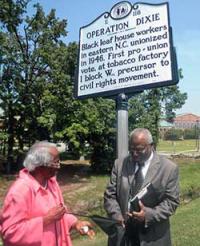By James Wrenn
Rocky Mount, N.C.
 A North Carolina Highway Historical Marker recognizing the 1946 tobacco leaf house workers union campaign was unveiled in Rocky Mount by the Phoenix Historical Society on Sept. 3. The United Electrical Workers union, Local 150 co-sponsored the event.
A North Carolina Highway Historical Marker recognizing the 1946 tobacco leaf house workers union campaign was unveiled in Rocky Mount by the Phoenix Historical Society on Sept. 3. The United Electrical Workers union, Local 150 co-sponsored the event.
Entitled Operation Dixie, the marker stands on N. Franklin Street at the corner of McDonald Street, across from the Imperial Centre, and denotes the China American Tobacco Company plant on N. Pearl Street, Rocky Mount, N.C., where workers cast the first pro-union vote in the campaign on Sept. 5, 1946.
Most African-American workers cast their first vote ever in this union election, since racist Jim Crow laws denied voting rights to Black people in North Carolina. This leaf house union campaign in 1946 is considered a precursor to the civil rights movement.
More than 90 people gathered at the Imperial Centre to hear remarks from Duke University historian Robert Korstad (author of “Civil Rights Unionism”), UE Local 150 Vice President Larsene Taylor and N.C. AFL-CIO President James Andrews. Rocky Mount City Councilman Reuben Blackwell read a moving resolution from the City Council honoring the courage of the tobacco workers of 1946.
Retired Wilson tobacco union worker Dorothy Edwards gave tribute to the pioneers of 1946 who paved the way for workers’ rights and civil rights in eastern North Carolina. The highlight of the day was 94-year-old Cora Baines Tann, who was a worker at China American and joined the FTA-CIO union in that historic 1946 vote. She and James Andrews had the honor of unveiling the marker.
Leaf house workers, who were 100-percent African-American and 75-percent women, stemmed and processed tobacco in miserable working conditions with low pay and 12-hour shifts under often abusive white male supervisors in factories across eastern North Carolina. These workers were at the base of a very profitable tobacco and cigarette industry.
In the summer and fall of 1946, nearly 10,000 leaf house workers joined unions in a massive organizing campaign called “Operation Dixie” with the Food, Tobacco, Agricultural & Allied Workers of America, and also the Tobacco Workers International Union.
The first pro-union vote by Chinese-American workers was followed by 26 more pro-union votes in the next two months in the North Carolina towns of Oxford, Henderson, Rocky Mount, Greenville, Wilson, Smithfield, Goldsboro, Kinston and Lumberton, and South Boston, Va. Workers secured union contracts in over 30 tobacco plants that resulted in higher pay, eight-hour workdays, paid holidays, improved working conditions and grievance procedures to address abusive supervisors. Today, only two tobacco union locals remain.
The Phoenix Society will present a lunchtime “History a la carte” program on Operation Dixie at the North Carolina Museum of History on Wednesday, Feb. 8, 2012, at noon.



